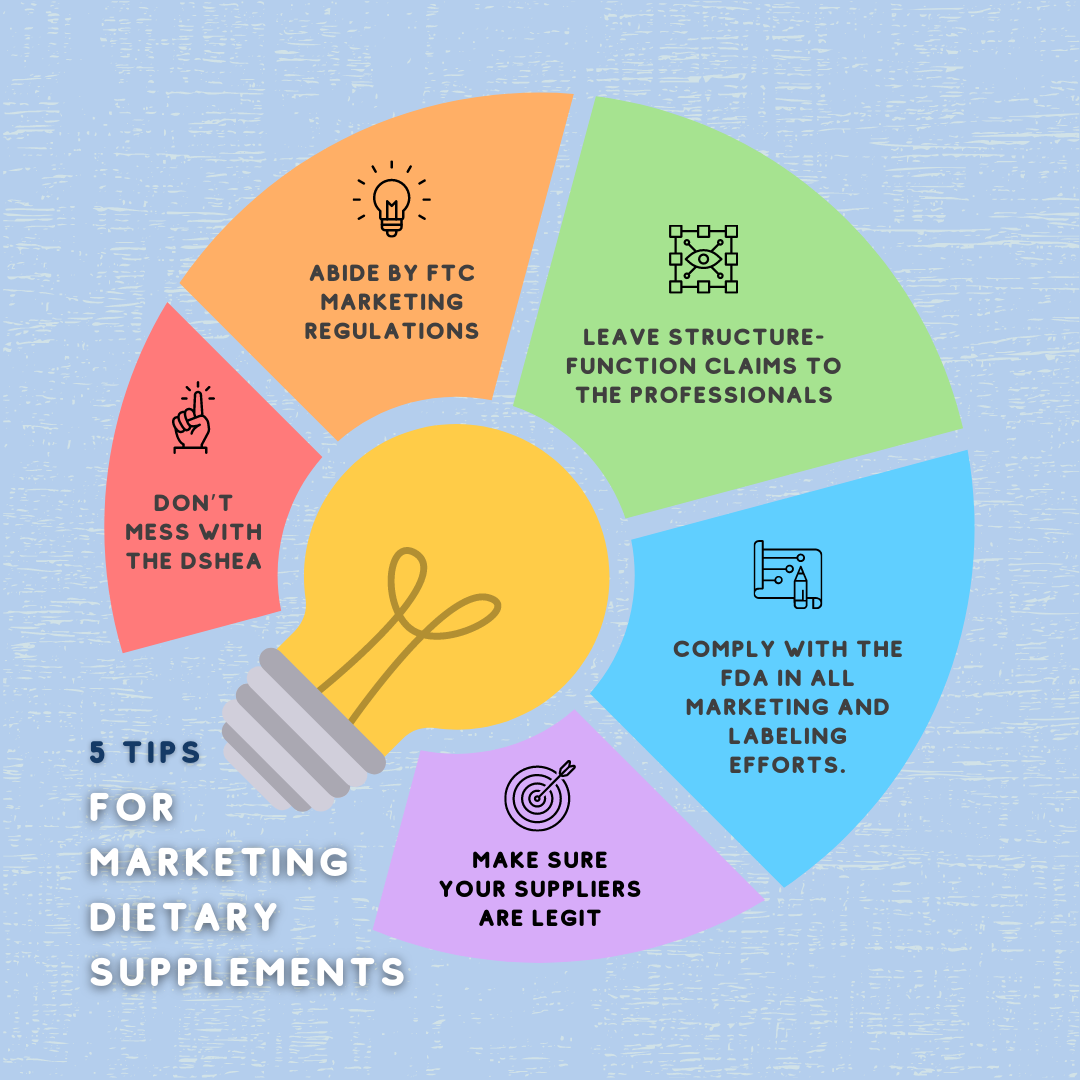Top 5 Legal Tips for Marketing Dietary Supplements
Top 5 Legal Tips for Marketing Dietary Supplements

 Marketing Dietary Supplement Legal Tip #1: Don’t Mess with The DSHEA
Marketing Dietary Supplement Legal Tip #1: Don’t Mess with The DSHEA
The Dietary Supplement Health and Education Act (DSHEA) was passed in 1994 to define and regulate dietary supplements. This law is hated by many as some believe it favors dietary supplement manufacturers, allowing for dangerous products to be distributed to consumers without proper testing.
“The deal that DSHEA and NCCAM made with the public was this: Let the supplement industry have free reign to market untested products with unsupported claims, and then we’ll fund reliable studies to arm the public with scientific information so they can make good decisions for themselves. This “experiment” (really just a gift to the supplement industry) has been a dismal failure. The result has been an explosion of the supplement industry flooding the marketplace with useless products and false claims.”
– Steven Paul Novella, prominent skeptic and clinical neurologist
Here are some critical supplement labeling issues to consider before you begin marketing your supplements online. Under the DSHEA, companies marketing dietary supplements are allowed to make two kinds of claims on their labeling. First, companies may make health claims specifically authorized by the Food and Drug Administration (“FDA”), and second, statements of nutritional support. Health claims, such as representations about the product and a disease or health condition, are only allowed if these claims have been authorized by an FDA finding that there is a significant scientific agreement to support that claim. DSHEA requires that these claims on the labeling be substantiated, truthful, and not misleading, which is consistent with the Federal Trade Commission’s standard. The FTC has not only prosecuted the dietary supplement manufacturer, but also the other companies involved in the deceptive promotions.
Other Important DSHEA Points to Consider:
- The legal definition of dietary supplements is “…products taken by mouth that contain a ‘dietary ingredient.’ Dietary ingredients include vitamins, minerals, amino acids, and herbs or botanicals, as well as other substances that can be used to supplement the diet.”
- Tobacco is exempted as a dietary supplement.
- Dietary Supplements must include the following information with the product:
- Ingredients (including amounts)
- Intended Use (must be based on accepted scientific evidence)
- Use Instructions (dosage and ingestion instructions)
- Safety Information (side effects, contraindications, possible reactions and interactions, etc.)
- Company Information (product source, manufacturer and batch info)
- It’s important to note that there are different rules that apply to supplements and ingredients released before 1994 and those released after, but variants are too meticulous to include in this article. To ensure your supplements comply to these specific release-date related rules, consult with an experienced attorney who can help.
Marketing Dietary Supplement Legal Tip #2: Make Sure Your Suppliers Are Legit
Be sure to verify the legitimacy of your suppliers as if your financial security depends on it, because it may. If you someday hope to make millions with your supplements, vetting your suppliers should be the first step in your business plan. This is because manufacturers from overseas are not required to observe U.S. standards. The hardest part in finding a legit manufacturer is that some foreign suppliers will claim to be compliant with U.S. laws in order to score a job. When this occurs, cost-effective legal resources are scarce, so it is important not to trust a supplier’s word and instead, verify it yourself. If you don’t know the best way to avoid shady manufacturers, employ an inspector in the manufacturer’s country and have them do on-site visits. It may even be helpful to have a translator – both linguistic and sometimes cultural- so things don’t get lost in translation (literally).Marketing Dietary Supplement Legal Tip #3: Abide by FTC Marketing Regulations
Any product that is marketed to United States consumers will need to be compliant with FTC Regulations And Guidelines. The FTC’s main goal is to protect consumers from deception. Yes, it is true that the dietary supplement industry is semi-self-regulatory, but brand can’t ignore industry standards, unless they want to face hefty fines. Therefore, marketers have developed multiple dietary supplement disclosures in order to protect against FDA and FTC actions. Below is the most popular disclosure: “This statement has not been evaluated by the Food and Drug Administration. This product is not intended to diagnose, treat, cure, or prevent any disease.” Before you begin your online advertising and e-commerce campaign for your supplement, be aware of the FTC’s two basic prongs for analyzing a supplement advertisement: (1) the advertisement must be truthful and not misleading; and (2) before advertising, the company must have adequate substantiation for all objective product claims. Under the first prong, a deceptive advertisement is one that contains a misrepresentation or leaves out an important piece of information that is likely to mislead consumers acting under the circumstances to their detriment. Under the second prong, the FTC bears the burden to successfully prove one of two theories: either, (1) a “falsity theory” proving that the express or implied message conveyed by the ad is false, or (2) a “reasonable basis theory” proving that the advertiser lacked a reasonable basis for asserting that the message true. These supplement advertising laws are not very clear cut, and the lack of FTC compliance can carry significant consequences, including fines, penalties, and even permanent bans.Marketing Dietary Supplement Legal Tip #4: Comply with the FDA In All Marketing and Labeling Efforts
Supplement businesses need to stay up to date on Food and Drug Administration rulings and decrees because dietary supplement standards are constantly changing. It’s important to always be checking for more banned substances as the list is ever-changing.- Google Alerts: An easy way to keep up with ingredients contained in your dietary supplement is to set up google alerts for each ingredient. Act as soon as something pops up.
- Consult with a Dietary Supplement Lawyer: An attorney can be your regulatory watchdog and alert you of upcoming changes and may even be able to help optimize your business model to increase your profit potential and asset protection.
- Check the FDA website everyday: A notice is posted to their website whenever the FDA acts so it’s important to check it regularly.
Marketing Dietary Supplement Legal Tip #5: Leave Structure-Function Claims to the Professionals
The FTC and your state Attorney Generals are very sensitive about structure-function claims, which are any statements that address how a product affects the body. Examples of structure-function claims include:- “Collagen makes your hair grow”
- “[insert product name] helps reduce inflammation”
- “[insert product name] minimizes cancer”
- “[insert weight loss product name] will naturally suppress your appetite”
Need to Consult with a Dietary Supplement Attorney?
Look no further than RM Warner Law. Our attorneys know what to look for when marketing dietary supplements, and using influencers to sell your supplements online so get in contact today.Similar like this
You also might be interested in
How to Remove Defamatory Content from the Internet: Legal Options Explained
In today’s digital world, defamatory content can spread quickly online, [...]
What’s the Difference Between Libel and Slander? A Legal Breakdown
A false statement can spread quickly and damage someone’s reputation, [...]
How a Cyber Harassment Lawyer Can Help You Fight Online Abuse
The internet has changed the way we communicate, but it [...]
What To Do If You Appear on ‘Are We Dating the Same Guy’
How ‘Are We Dating the Same Guy’ Started Women have [...]





